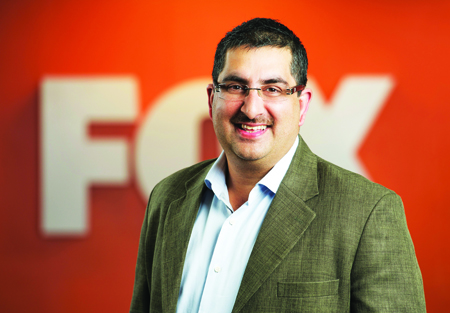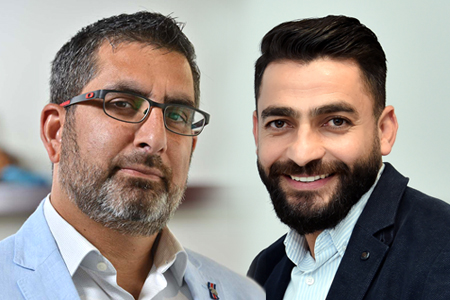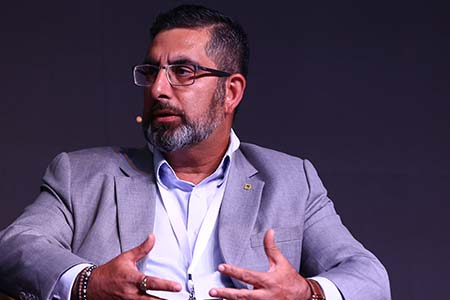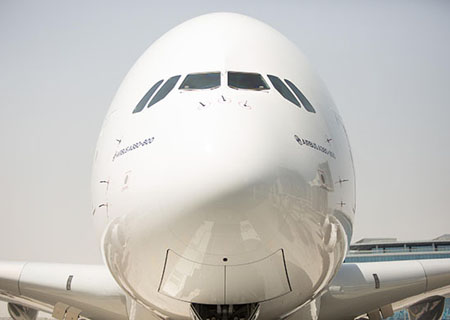In an exclusive interview with Vijaya Cherian, Sanjay Raina, GM & Vice President of Fox International Channels, speaks about the network's new business strategy and the secret behind Fox's rising success in the region.
 In an exclusive interview with Vijaya Cherian, Sanjay Raina, GM & Vice President of Fox International Channels, speaks about the network’s new business strategy and the secret behind Fox’s rising success in the region
In an exclusive interview with Vijaya Cherian, Sanjay Raina, GM & Vice President of Fox International Channels, speaks about the network’s new business strategy and the secret behind Fox’s rising success in the region
Two years ago, Fox Middle East suffered a setback when Abu Dhabi Media shut its pay-TV operations and Pehla was acquired by OSN, immediately making its offerings on both platforms redundant. It has taken two years for Sanjay Raina, GM & Vice President at Fox International Channels, to resurrect the network to its past glory and set it on a new path to profitability, with a refreshingly different business strategy that sees Fox straddling the pay and free-to-air spaces with equal ease.
Fox previously operated two FTA channels in the region. Raina, however, quickly realised the futility of confining himself to the crowded MENA FTA space, where there are now more than 800 channels scrambling for advertising revenue, which mostly goes into MBC Groups coffers.
FTA is hugely dependent on consumer spend. In the world and in this region, there is a subdued feeling of consumer spending. Advertising is down. If youre only focused on FTA TV and your source of revenue is FTA monies, then youre in for a tough call.
There are very few other than MBC that may be breathing very well in the FTA market, so something must be reset or re-input in the market for this sector to grow, he adds, calling the FTA space an I-live-in-hope industry, unlike pay, which assures a fixed monthly income from the subscriber.
There is an assured top line. I think a lot of FTA stations will rethink their strategy and join the pay-TV bandwagon.
Raina attempted something different for the first time in the region by moving two of Foxs channels from the FTA space to beINs pay platform. Seeing the success of this move, he and his team have been encouraged to test the waters with more content and are now looking to bring more genre-specific channels to the region.
We are breathing better with our new strategy to keep some channels in the FTA space and move others to pay, Raina says.
Our partnership with beIN has meant that Fox and Fox Movies have now come centre stage and we have bought additional content to ensure it is pay-TV worthy. We launched three movie channels Fox Action, Fox Family Movies and FX in the month of April on Etisalat, My-HD and Ooredoo. These are well made pay-TV channels. It has given more power to these three operators, and the channels are also performing extremely well on these three platforms.
Raina has gone one step further by attempting a global first with a Nat Geo Kids two-hour block on Majid TV. In this case, Fox has revisited international kids programmes and dubbed them locally for regional viewing. Seeing the success of this block, which airs in prime time KSA 7-9pm, the team is now evaluating launching a full-fledged National Geographic Kids channel and considering whether it should be in English or Arabic. If it takes off, the channel will be a global first for National Geographic, which does not operate any specific kids channels.
This block has been doing extremely well on Majid TV, says Raina, adding that it has become possible to bring more National Geographic content to the region because Fox now has a 73% stake in National Geographic Partners as part of a $730m deal. This gives the team access to a lot more content, including kids-related National Geographic content.
Before the partnership, we used to be their international partners for television, but now it is a Fox-owned product. This new entity has been set up between National Geographic Society and Fox. It means Fox now has access to all of National Geographic Societys assets, including its books, magazines, travel and merchandise among others, Raina confirms.
We are re-scripting some of the content and have employed dubbing agencies within the region to use kids voices or kid-friendly voices. At the moment, we have some 360 hours of programming that we deliver every year on this two-hour block. We dont have a channel called NG Kids, but there seems to be interest in this region for one.
Raina believes this is only the tip of the iceberg and is brimming with ideas on how to provide more value to viewers.
Customers today are becoming finicky and monies are tough. People are looking for value-adds. Imagine your basic package costs you $100. You could tell them that for an additional $10, they can download an app that offers a 20% discount on travel for a Nat Geo cruise or a Nat Geo lodge, or you can get 200 hours of free programming from Nat Geo. Those are the kind of value-adds that viewers need, in addition to really good content.
Raina is keen to bring dollar-plus value-adds into the mix.
Otherwise, people are, at some point, going to question why they are paying $120 a month on entertainment in summer when everyones on holiday. We are going to be very vigilant about opportunities. As a content player, our job is to seize any content opportunity and be present there.
We would also love to work with everybody rather than restrict ourselves. We are not necessarily exclusive. Fox and Fox Movies are exclusive to beIN, but the rest of our products are not exclusive. That is the best way to move forward according to us.
At the moment, most content owners charge a fixed fee to platforms to run their channels. Raina says platforms should be willing to explore the cost per subscriber (CPS) model.
Globally, payment doesnt always mean only a fixed fee. Most companies pay a lower fixed fee but include a CPS model. The more popular the channel, the more money the platform pays to the channel owner. With the CPS model, it is incumbent upon the channel owners also to ensure better content. If you are able to sell more and perform better, it works for both the platform and the channel.
Fox is working towards building a strong content base at the moment in the region. The network presently has around 52 people at its Abu Dhabi office and 20 at its Dubai office.
We have a strong programming team in the region and they are based in Abu Dhabi. This team deals with all the Hollywood studios, including Paramount, Warner, Sony, independents, Miramax, and we buy products from them.
In addition, Fox is looking to explore opportunities to launch channels in Arabic and other languages.
There is so much opportunity to provide more content to the population here, especially within specific genres like crime, lifestyle and travel, and also within different languages.
Fox has also introduced several firsts within the UAE. National Geographic Abu Dhabi, for instance, is the first to be named after a city globally. In addition, the team has been doing extremely well in terms of producing branded content and is averaging eight to ten productions a year. Several projects have already been produced, including the UAE armys first trip to Everest, which is due to air in November or December; a documentary on the conscription of young Emirati men and women; another on Almarai, showing the highly nutritious grass the dairy company grows in Argentina for its cows; and the development of the Abu Dhabi and Dubai International Airports.
We also did a programme with Land Rover, attempting to cover the spot where the Tropic of Cancer passes through the UAE, Raina says, reiterating that the network is looking increasingly at value-adds and the possibility of launching more products that consumers can associate with the National Geographic brand.
We are very hopeful that we can have an extension of National Geographic on FTA, but we dont know in what form. It may be science. We have got ourselves into both areas now, but we have kept our factual channels within FTA while we are going as wide as we can with pay, Raina adds.
Fox is also in discussions with a number of local entities to bring fact-based information to the floor in partnership with National Geographic. While Raina has set the stage for Fox to explore new partnerships in the near future, he believes media entities in the region can achieve a lot more through collaboration. One of his big concerns is that most pay TV networks still operate in silos here. He believes collaboration is the way forward for an industry that wants to grow subscriber numbers and change the viewer mindset.
At the moment, there are deep distinctions between what each pay-TV operator offers in terms of content. While ones forte may be entertainment, the others seems to be sport, while still others are focusing on low pay. North Africa is mainly French so they dont count. Most operators stay away from Egypt because regulatory rules are very tough. Thats 80 million people ruled out. Iran is out of the question. Whats left? If we dont come on to the same platform and discuss what needs to be done to up the values and volumes of this industry, we will indeed reach a plateau.
Raina set the stage in the region by being the first to move a couple of Fox’s channels onto a pay platform. Since then, we have seen other high-profile channels like Fatafeat from the Discovery stable move into the pay space as well. Without doubt, some other FTA channels will see value in moving out of their comfort zones to explore the possibility of having their hand in the pay/subscription pie as well. It will be interesting to see how this pans out.













































































